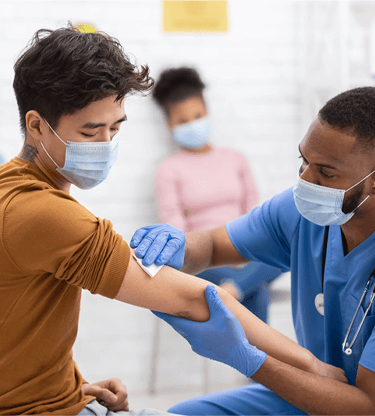Vaccinating to economic stability

The Coronavirus outbreak has subjected financial and economic markets worldwide to a great deal of turmoil, stress and uncertainty.
4 minute readHowever, the successful roll-out of vaccinations and the easing of social restrictions in the UK and the USA has helped assure investors and currency traders that normal economic life will start to return.
In this article, we’ll take a closer look at the effect that COVID has had on foreign exchange rates. We shall then explore how the UK FX market has performed in 2021 and how this performance may have been affected by the UK government’s vaccination programme.
How has COVID affected FX rates?
March 2020 saw the pound plunge to its lowest level against the dollar in more than 30 years, as the spread of the coronavirus caused spooked investors to turn to the US dollar.
This was in part due to the strength of the dollar, which, thanks to its status as a safe haven, performs well in times of volatility in the global markets. This is supported by the fact that the euro also weakened against the dollar during this period.
However, the pound’s value was particularly affected by the Coronavirus headwinds: it weakened against the dollar to a greater extent than the euro, and it also depreciated against the euro, falling to its lowest level in 11 years (€1.06). One explanation for the pound being particularly badly affected is that the UK economy’s dependence on foreign capital flows and the announcement of a £350bn stimulus package, which led to expectations of increased borrowing.
The pound quickly recovered in value from April 2020 onwards, and the euro appreciated against the dollar over the summer as optimism grew that Europe’s economy would start to reopen. The remainder of 2020 saw a greater degree of stability in the foreign exchange markets as traders and investors started to adjust to the ‘new normal’. As one might expect, currencies that are viewed as safe havens, such as the US dollar, Japanese yen and the Swiss franc, performed well.
How have increasing rates of vaccination affected the UK FX Markets?
The UK’s success in vaccinating its population has won it international recognition – and it has also helped it on the road to an economic recovery. This is reflected in a steady rise in the value of sterling.
As optimism began to spread that the UK’s vaccination rollout would help the economy to rebound at a faster rate, the pound hit $1.40 against the dollar for the first time since 2018 in February 2021. February saw the UK government hit its target of vaccinating 15m of the UK’s most vulnerable people:
Whilst this period above the $1.40 mark was short-lived, the pound rose above this point again in the month of May and June, as can be seen in the above chart. This rise in value was spurred by the easing of Covid-19 protocols, which proceeded as planned throughout May, coupled with strong election results for the government.
An even more pronounced rise is to be observed when looking at the GBP/EUR exchange rate, with the pound rising from below €1.09 in December 2020 to just under €1.18 in April 2020:
This appreciation against the euro is explained in large part by the fact that the UK outperformed the Eurozone countries with regard to vaccination rollout. Whilst Europe succeeded in vaccinating just 15% of its population in the first quarter of 2021, the UK and US achieved 40-50% coverage over the same timeframe.
However, as expected, a number of countries in the European Union, such as Malta, Portugal, Spain, Ireland, and Belgium, overtook the UK in terms of the percentage of their populations who had received the vaccine. By September 2021, the UK had fallen to 13th in the rankings of percentage of population vaccinated, with just 63.8% having received both vaccinations.
Vaccines and FX trading strategies
Many traders regard the fight against the Coronavirus as an essential first step on the road to economic recovery. As we have seen, there is a clear relationship between the value of the pound sterling and vaccination rates in the UK, which ranks amongst the top five countries in leading the fight against COVID.
Whilst currency trading is fraught with risk, traders would be well-advised to take account of inoculation and infection rates when placing bets on currency pairs appreciating or depreciating in value.


